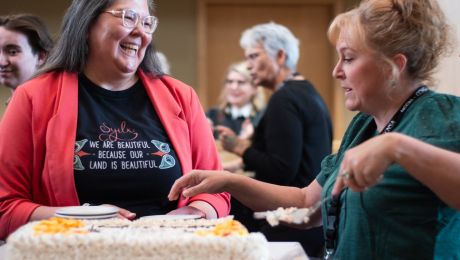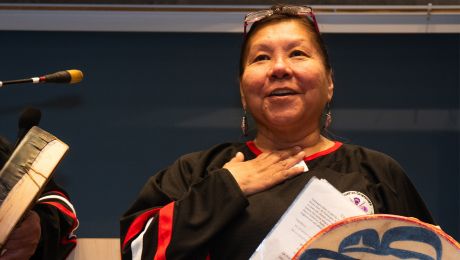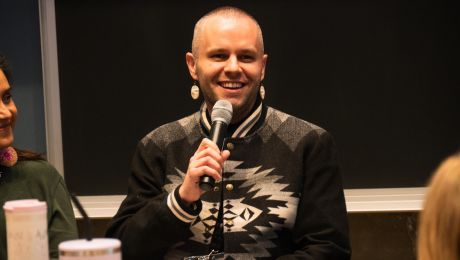Event held on May 7, 2025, recognizes two decades of supporting Indigenous health and well-being
 Image provided courtesy of Aspen Films Inc.
Image provided courtesy of Aspen Films Inc.
“We recognize and honor the work that uplifts the voices, wisdom and wellness of the Indigenous people of our lands. The NCCIH’s commitment to community-driven, culturally-grounded research aligns with our own ways of knowing, sharing and caring for generations to come.”
These words from Lheidli T’enneh Elder Darlene McIntosh’s opening prayer summarized the essence of an event held May 7 to celebrate the 20th anniversary of the National Collaborating Centre for Indigenous Health.
The anniversary event was held both online and in-person at the University of Northern B.C. (UNBC) in Prince George, B.C. The university hosts the Centre, which is one of six National Collaborating Centres (NCCs) for Public Health.
Participants represented the breadth of the Centre’s work over 20 years, as the event brought together former and current leaders, Advisory Committee members, staff members, and representatives of organizations that support and share the NCCIH’s vision to support optimal health and well-being of First Nations, Inuit and Métis peoples by creating health structures and systems that are responsive to Indigenous self-determination, informed by Indigenous-led evidence, and shaped by Indigenous cultures and knowledge systems.
Former NCCIH Advisory Committee member Madeleine Kētēskwew Dion Stout describes these people as “founders, grounders and pounders.”
As examples, she named founders like Dr. Margo Greenwood, who was the Centre’s first Academic Lead and who led the NCCIH for 17 years before taking up an appointment as a Senator.
We recognize and honor the work that uplifts the voices, wisdom and wellness of the Indigenous people of our lands. The NCCIH’s commitment to community-driven, culturally-grounded research aligns with our own ways of knowing, sharing and caring for generations to come. – NCCIH Elder Advisor, Darlene McIntosh
“Grounders like Albert Marshall, Don Fiddler, Dr. Tom Dignan, and many other Advisory Committee members. Pounders, like [Centre Director] Sarah de Leeuw, [Research and Operations Manager] Donna Atkinson, and other staff."
“They work tirelessly to produce useful health and well-being documents and to communicate findings for dispensation far and wide,” said Dion Stout in a message recorded from her home in Winnipeg. “This 20-year celebration is a time for triumphant outcries of victory over poverties and pathologies of all kinds that plague Indigenous peoples, communities, and Nations.”
Dr. Greenwood travelled to Prince George for the event. After being blanketed by Advisory Committee Chair Dr. Warner Adam – a traditional ceremony to confer protection – she recalled sitting in her office by herself 20 years ago, trying to determine how the Centre should be shaped.
“Because there were no road maps. There were no documents – not even a memo – to say, ‘this is what this is going to be.’ We had to figure it out.”
Dr. Greenwood said ‘figuring it out’ involved calling on a wide network of colleagues from across the country to forge a centre to support First Nations, Inuit, and Metis people.
 Image provided courtesy of Aspen Films Inc.
Image provided courtesy of Aspen Films Inc.
“I wanted to do that by lifting up their voices, because in universities our voices were not heard often. I wanted First Nations, Inuit, and Metis people to be proud and to know that this center belonged to them… and I know we've reflected that,” she said. “And it's all of us who did. It wasn't just me; it wasn't just a team. It was everybody who wrote for us, who supported us, who came to dialogue circles, who came to conferences. They did it. You did it. Everybody did it. So, thank you.”
Dr. Greenwood also expressed her gratitude to Dr. Terri Aldred for accepting the position of Academic Lead. Dr. Aldred assumed the position on May 6, taking over from interim Academic Lead Dr. Deanna Nyce, who has returned to her position as a member of the NCCIH Advisory Committee. Prior to Dr. Nyce’s term, Dr. Sheila Blackstock and Dr. Daniel Sims shared the role after Dr. Greenwood left to join the Senate.
Dr. Aldred is Dakelh from Tl’Azt’En on her mother’s side and mixed European and Métis Cree on her father’s side. She has served on the Centre’s Advisory Committee for three years and has been involved with the Centre and Dr. Greenwood for years before that. However, she said it was a much earlier connection with a Centre leader that changed the course of her medical career.
That connection took place following a powerful experience Dr. Aldred had working with Native Hawaiian Elders in Hawaii where she was doing an international elective during the second year of her medical residency in the Indigenous Family Practice Program at the University of BC (UBC). She described this experience to Dr. Danièle Behn Smith who was the site director of the program. Dr. Behn Smith (who is the Deputy Provincial Health Officer for Indigenous Health in B.C. and a new member of the NCCIH Advisory Committee), suggested Dr. Aldred write about it for her resident research project and she put her in touch with Sarah de Leeuw, Director of the NCCIH.
When I think about a vision, my commitment is that our focus will be to serve our communities that are the most remote, that are the most oppressed – the ones that are the least safe – first… Because when we serve them first, it actually benefits all of us. – NCCIH Academic Lead, Dr. Terri Aldred
“And [Sarah said] ‘this sounds like an amazing auto-ethnography with an Indigenous methodology – and you could loop in narrative medicine, which is a core skill for cultural safety in the profession of medicine,’” said Dr. Aldred, who said she had not heard of some of these terms before. Nonetheless, a spark was struck.”
“I got to work learning about all of these disciplines, and the way that we use art and writing to transform our experiences as healthcare professionals, but really as people and as Indigenous people with lived experience, with important stories to tell that inspire and lead to transformative change. Like the story of the National Collaborating Centre and Margo's stewardship. That's a powerful story about what community and relationships can do.”
“And so, it made me be able to see myself in terms of things like teaching and research, because it was the first time I had seen research that really reflected my values, and the kind of research that I felt would help guide my practice in a good way.”
Dr. Aldred says she wants to use her new role as the Centre’s Academic Lead to make the healthcare system more equitable.
“When I think about a vision, my commitment is that our focus will be to serve our communities that are the most remote, that are the most oppressed – the ones that are the least safe – first… Because when we serve them first, it actually benefits all of us.”
Friends of the Centre described the importance and the influence of its work in messages delivered in person and in a recorded video message.
“The collaborating center is a collection of dedicated people that had a vision … to really do something meaningful, powerful, and impactful,” said Dr. Geoff Payne, President of UNBC. Dr. Payne couldn’t attend in person so Dr. Davina Banner, Interim Associate Vice President of Research Operations, delivered UNBC’s congratulations at the event.
 Image provided courtesy of Aspen Films Inc.
Image provided courtesy of Aspen Films Inc.
“Few organizations get to endure multiple decades, let alone sustain the important accomplishments nationally and internationally, that this center has achieved,” she said. “This truly is a testament to the work of the NCCIH, including the past and present leaders, the staff, and all that interact with the centre.”
Several speakers echoed the sentiments of Dr. Adam that the NCCIH offers an Indigenous perspective on health research that is crucial.
“Many times, our knowledge has been stolen. It hasn't been translated properly,” he said. “The Center provides policymakers and partners with knowledge that comes directly from the Indigenous communities, and for that I really applaud the work that the staff has been doing.”
“The Centre is important because Indigenous people's lives have been framed through lenses that are not our own for so long,” said Sarah Hunt / Tłaliłila’ogwa. Hunt is the Canada Research Chair in Indigenous Political Ecology and an Associate Professor at the School of Environmental Studies at the University of Victoria.
“Having Indigenous perspectives on our health determinants, the priorities, the needs, the approaches, is an essential part of our self-determination and our ability to shift and transform. So, I think that a center like NCCIH really powerfully provides a space for all of us who are concerned about our health and well-being, about our future, the current state of our communities and families to come together and…take up those issues in a collective way.”
Speaking in French in a message recorded from Wendake, Quebec, former Advisory Committee member Marjolaine Siouï said: “The important thing about this work is precisely its mission to work primarily with Indigenous peoples, to influence public policy, to influence the work of governments, to help them better understand the realities, as well as all the diversity that there can be among our peoples and also among different territories.”
The important thing about this work is precisely its mission to work primarily with Indigenous peoples, to influence public policy, to influence the work of governments, to help them better understand the realities, as well as all the diversity that there can be among our peoples and also among different territories. – former Advisory Committee member Marjolaine Siouï
Siouï, who is Executive Director of the First Nations of Quebec and Labrador Health and Social Services Commission, also noted that the Centre “has always been a place for learning, a place for exchanging ideas, for nurturing. I really wish them to keep going well and … [be] this source of inspiration for generations to come.”
Longtime Advisory Committee member Michael Bird lives in Albuquerque, New Mexico, where he is the Past President of the American Public Health Association. Bird said that while the Centre has always been what he called “a bright light,” its work is even more important in the turbulent times the United States is going through now.
“We are encountering roadblocks here and obstacles [so] it's really critical for the folks in Canada to offer some hope and to do good and do well, because we're going to be drawing on that.”
Elder McIntosh summarized the hopes for the future of the Centre in her closing prayer: “May the participants take what is needed, bringing the knowledge received back to their communities. And may you leave with inspiration, excitement, understanding, patience, and enthusiasm.”
Multimedia relating to the 20th Anniversary celebration